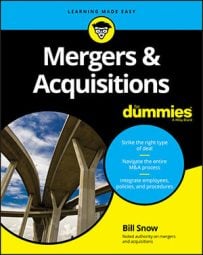When writing an offering document, you need to include an argument for why the M&A deal is a good choice for the Buyer. One of the following thesis options might suit your offer:
Recurring revenue thesis
A company with recurring revenue (revenue that automatically generates, such as that from fees or subscriptions) is often a more-desirable buy than a company where the sales force has to make new sales every year, month, or week. Many Buyers are often willing to pay a premium for that consistent revenue stream.
Just an old fashioned growth story thesis
This thesis is the ol’ venture capital, “we’re going to take over the world” story. Sure, the growth story deal often results in a flameout, but certain investors are willing to pay a hefty premium for a company that touts an incredible ability to grow.
Owners who want to retire or otherwise take some chips off the table should be wary of using the growth story thesis. When an investor puts money into a growth story company, that means the money stays with the company to pay for growth! The ability for Seller to garner a premium by selling a growth story company and pocketing that money are extremely remote.
Synergies thesis
Otherwise known as the “You complete me!” thesis, the synergies thesis is a situation where 1 + 1 = 3. Two companies, perhaps in the same industry or closely related ones, have certain strengths and certain weaknesses that complement each other such that the result is greater than the sum of its parts.
For example, suppose two companies are in the auto parts distribution business. One company goes to market through a catalog, has a world-class distribution center, and a strong customer service department. However, competitors who are excellent Internet marketers are eating it alive. The second company is an ace at Internet marketing but lacks a customer service department and relies on a very expensive outsourced distribution center.
In this example, the second company may be willing to pay a premium to buy the first company to fill in its own weak spots. The two companies are stronger together than they are separately.
Deals with this thesis can be extremely tricky to negotiate. Most often, Seller needs to tailor a specific message to each potential Buyer; after all, not every Buyer needs the same weakness addressed. Don’t make up a story; just realize that different Buyers may view different aspects as the most valuable.

